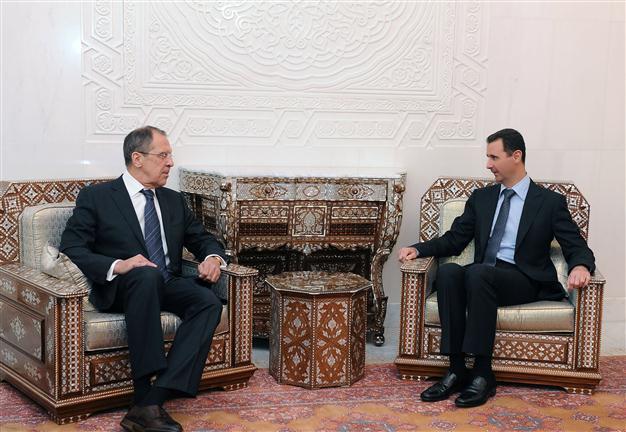Lavrov says Syrians should decide Assad's fate
MOSCOW - Agence France- Presse

In this photo provided by the Syrian official news agency SANA, Russian Foreign Minister Sergey Lavrov, left, meets with Syrian President Bashar Assad at the presidential Palace in Damascus, Syria, Tuesday, Feb. 7, 2012.
Russian Foreign Minister Sergei Lavrov, back from talks with Syrian President Bashar al-Assad, pointedly declined to say Wednesday whether Moscow asked the embattled leader to go, stressing that Syrians themselves should decide his fate."Any outcome of national dialogue should be the result of agreement between the Syrians themselves and should be acceptable to all Syrians," Lavrov told reporters.
He sidestepped a direct question from a reporter who asked Russia's top diplomat whether he urged Assad to step down during their talks in Damascus Tuesday.
"Trying in advance to decide the result of national dialogue is basically not the job of the international community," Lavrov said, adding that both the government and all the opposition forces should sit down for talks. All those who have influence over the Syrian opposition forces should urge them to start negotiations with Assad's government, he added.
Lavrov, who was given a hero's welcome by Assad's supporters in Damascus, also said that recalling envoys from Damascus would not help the Arab League's plan.
"I do not think that recalling ambassadors helps create conditions that would be favourable to the realisation of the Arab League's plan, he said.
A day after the United States closed its Damascus embassy, France, Italy, the Netherlands and Spain joined Britain and Belgium on Tuesday in recalling their ambassadors to Syria for consultations.
The six Arab states of the Persian Gulf said that they had decided to expel Syria's envoys and withdraw their own from Damascus in protest over the "mass slaughter" of civilians.
"To us at least this logic is not clear," said Lavrov, "as was unclear the hasty decision to freeze the work of the Arab League's mission in Syria." "The presence of foreign observers always plays a restraining role and it was unclear why a number of Gulf states recalled their envoys from this mission and why the mission after that was suspended at the very moment its report was supposed to be heard at the UN Security Council." After Tuesday's talks Lavrov said Russia was prepared to work to end the crisis under a peace plan put forward by the Arab League and that Assad was ready for dialogue with all political forces.
He did not specify whether he was referring to the latest Arab League plan calling for Assad to step down or a November plan which called for an observer mission and an end to violence.
Nor did he give any indication about Russia's view of Assad's political future.
Moscow sparked Western anger last week by joining Beijing in using its veto at the Security Council to block UN action against the Damascus regime, in what US Secretary of State Hillary Clinton called a "travesty." Seeking to address Western criticism that Russia missed a chance to end bloodshed in Syria, Lavrov on Wednesday defended Russia's veto, saying Moscow had not allowed the opposition's armed units to take control of more cities.
"We have missed an opportunity to allow armed units which are fighting against government forces to take control of cities and villages," Lavrov said in sarcastic remarks.
"Yes, we've missed this opportunity. If the authors of the resolution have this goal in mind, then you should directly say that we want the armed units to take control of cities in Syria." "You need to speak honestly with your partners," he added. "Half of the truth is worse than a lie."
















